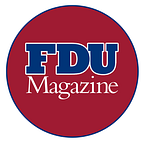History Is Her Story
Angela Morris, Student of History, Shapes Her Classes Based on the Social and Political Moment
By Mary Ann Bautista
Inside the classroom in a 16th-century abbey in rural England, the topics are riveting — #MeToo, immigration, Brexit and the gender pay gap — and the discussions animated. Bridging these topics is Angela Morris, tutor and lecturer in social policy and history at FDU’s Wroxton College.
It is a role that Morris, who joined Wroxton in 1995, delights in. Early on, her parents and a teacher nurtured her passion for history. “My parents would regularly take my sisters and me to visit historic National Trust properties,” she remembers. And she grew up in Chester, a historic English city, originally the Roman settlement of Deva, surrounded by Roman history. “We played in the Roman amphitheatre as if it was the most normal thing to do,” Morris says. “My amazing history teacher, Mrs. Veats, also encouraged me to take my studies seriously and to have confidence in my ability.”
Morris’ goal is to provide the same inspiration to her students. “I love ‘unlocking’ history and sociology for students who haven’t revisited these subjects since high school,” she says. “Grasping a subject, overcoming challenges to learning or simply discovering a topic you never knew about before is so intellectually and emotionally rewarding.”
In two of the courses she teaches, “Women and Race in Modern Britain” and “Social Policy in Contemporary Britain,” adaptation is a must. “The material relevant to both courses changes frequently as social, economic and political events evolve,” Morris explains. “The election of a new prime minister, for instance, usually leads to a Cabinet reshuffle and alteration to the gender and ethnic balance of government.” Thus, Morris “regularly rewrites substantial sections of lectures as events unfold and bring new issues to prominence or cause a reevaluation of old ones.”
“Because of Brexit, our constitution has been tested and challenged at a fundamental level. It has divided families, ended friendships and created political tensions. All of that matters a great deal to me as a student of political history,” — Angela Morris, tutor and lecturer in social policy and history
“Brexit, for instance, has put a new complexion on immigration,” she says. “When Britain voted to leave the EU, most attributed the decision to hostility toward ‘freedom of movement’ from EU countries.” Recent survey data, however, indicates that Britons have a more positive view about immigration and are less concerned about immigrants than their European neighbors.
Immigration is also discussed extensively in Morris’ “Women and Race” course. “Many students inevitably reflect on their own heritage as the children or grandchildren of migrants to the United States and the benefits they have gained from a new life in a safe and prosperous country,” she says. Her classes are also examining the #MeToo movement, which Morris describes as “a wake-up call for everyone. It has, I think, changed the discourse on sexual harassment both in terms of what it means and the seriousness with which we take such allegations.”
“Lightbulb” moments make teaching worthwhile. “It gives me great fulfillment when students say they finally ‘get’ a subject and that they’re inspired enough to find out more about a topic when they get home,” she says.
Morris believes her students leave Wroxton feeling enriched by the academic and social experience of studying abroad. “They fly back to the U.S. with more confidence, a suitcase of memories and a very important set of life skills,” she says.
She hopes, in small part, that she’s added to their life-changing Wroxton experience. “I hope that when my students look back on their lives they’ll remember a teacher in England who helped them enjoy learning, write a little better, find a love of history and sociology and who, perhaps, encouraged them to do the same for others,” she says.
Ed. note: A version of this article first appeared in the Winter/Spring 2020 edition of FDU Magazine.
